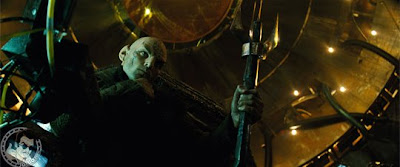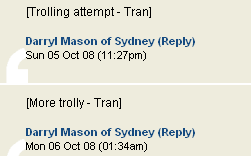By Darryl Mason
Australia is under attack, PM Kevin Rudd, tells us, by the forces "of extremist capitalism." After Thursday's stock market blood-drainer, these forces seem to be winning. Or at least, what they set into motion is still wreaking incredible damage to the Australian economy.
How much has the stock market lost in the past year? A few hundred billion? Al Qaeda nuking Adelaide would have cost the economy less. So who is the greater threat? Al Qaeda kills people in the vicinity of the bombs they explode. Financial terrorists shred shrapnel into everybody.
We supposedly know who Al Qaeda are, or at least some of them, the few who can bother to front up in front of a webcam every few months, and the various leaders who we keep killing, over and over again.
But what about these "extremist capitalists"? Who are these financial terrorists?
Can we have some names, please? Are there ten of them? Or a few hundred? What do we know about their sleeper cells? What is their ideology of hatred? Why do they hate our values of a fair go and rewards for hard work so very, very much? Will they be held to account for what they've set into motion? Why aren't any of these financial terrorists being arrested? Why aren't we seeing them being hauled in and out of police stations in shackles? Will they be waterboarded to get at the truth? And why will so many of them get to keep their jobs, even if on greatly reduced pay?
The financial terrorists who are gutting the savings, investments and retirements of millions of Australians seem, today at least, to be even more illusory than Al Qaeda. One enemy lives in caves and poverty-smashed villages in the middle of fuck-all nowhere. The other extremist enemies live amongst us, they fly over our traffic choked streets in helicopters for their daily commute, and they live in most of their same pre-The Great Fucktober Crash Of 08 splendour. Well, that's not completely true. Some of these nation-shattering extremists have already headed off for calmer waters in the 80 foot floating palaces they built from the fleecing of thousands of work-haggered 65 year olds, who are now contemplating another decade of unexpected labour, or battling with a rising tide of unemployed youth for fewer and fewer jobs.
It's all but too late now, but where was that Financial Terrorism Hotline, so those that knew could have anonymously dobbed all those fuckers in?
In a stunning week of actual non-boring financial news, it was also remarkable to see just how much money an Australian government can make available in a time of "national emergency". More than $10 billion to the people, before Christmas. With a commitment to prop up banks and institutions that could soar into the hundreds of billions.
Ten billion dollars, thwomp, slammed down on the table, to save the Christmas spending season from expected disaster.
But do you know any pensioners or families planning to rush out and blow their government mini-bailout on Christmas presents?
There is definitely a mood of "thanks, but that'll go to pay off some debts" instead. Shopping malls around Australia are emptying of customers, and soon, staff, as people quickly begin to realise just what they can actually live without.
Paying off debts before guilt-induced holiday consuming is never a bad decision, but if the point of throwing around ten billion in cash is to get the people back into line at the checkouts, it doesn't seem likely it will pay off. Even if most people take their fresh cash to their local megacentre, it will only delay the inevitable mass layoffs of Generation Y staff for a month or two more.
Most elderly pensioners won't be splurging but will probably be remembering the once easily dismissed warnings from Depression-era grandparents and will be stockpiling long life food, or ripping out the ornamentals and laying in vegetables for next year. Just in case.
You might want to take up veggie and herb growing as a hobby, very soon. You know, just in case. My local supermarket in Sydney put up a big stand of vegetable and herb seeds a couple of weeks ago, after months of requests from locals. They couldn't re-stock that display fast enough. They've now sold out of just about everything, with a few days delay in getting more seeds, or maybe a week.
I found the seeds I wanted in the next suburb. But still, it was a strange experience to go to a local shop to buy more seeds, and find they've run out. Another sign of these unnerving times.
And here's an excellent, edible, street beautifying project we should see all over our towns and cities. It sure beats lining up in a petrol station carpark for four hours, waiting for the government food trucks to maybe arrive :
The English have their allotments; in Sydney we use the streets. In a variation on guerilla gardening, Sydneysiders are moving veggie plots from the backyard to the street verge, and converting formerly fallow public land into mini-market gardens.
"Environmentally, ethically and, from a community perspective, it's a great thing to do," says Eva Johnstone, a landscape architect, who with her husband, Bill, has been growing vegetables on their Marrickville street verge for the past two years.
"We always wanted to grow our own food, but our backyard is quite small, so the logical step was to grow it on the street, which was not being used for anything," Ms Johnstone said.
The Johnstones now have an established vegetable garden, with spinach, artichoke, rhubarb, peas, potatoes, beans, broccoli and beetroot. A nearby tree bears a passionfruit vine and a sign telling passersby to help themselves.
Street verges are council property but Mrs Johnstone says the council has been "happy to turn a blind eye.
Global warming, the drought and rising food prices have other Sydneysiders looking at local solutions to food production, says Michael Mobbs, a sustainability expert. A year ago, he and fellow residents of Myrtle Street, Chippendale, planted their nature strips and footpaths with a range of edible plants, including tomatoes, herbs, strawberries and fruit trees. Raspberries, rocket, native mint and passionfruit vines climb the telephone poles.
"We want to show people that they can grow food where they live and return to simpler, lower-impact lifestyle," says Mr Mobbs,....
Other councils are following suit.
The mayor of North Sydney : "We would certainly be very supportive if communities wanted to grow veggies in their street, as long as it's a community initiative."











